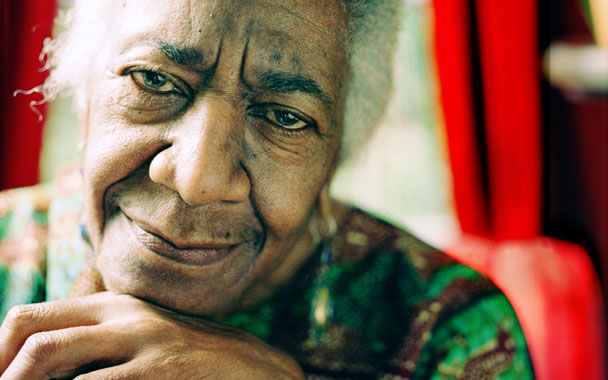We're sitting in the small kitchen of the three-bedroom flat in Decatur, Georgia, that Edna Lewis shares with her housemate (and best friend and protégé), a young chef named Scott Peacock. It's Lewis's birthday, and Peacock is at the counter, working on a celebratory supper. I'm the first guest to have arrived.
"Whatcha makin' there?" Lewis calls to him, half winking at me.
"Never you mind, mother," Peacock answers tartly. "You just sit and talk."
"I haven't much to say," she says, smiling her famous, ever-girlish smile.
Peacock, deftly slicing the opaque demiglobe of a crisp Vidalia, murmurs, "I'm sure."
They parry a bit more, laying on a little extra, perhaps, for their interested visitor. None of it is put-on or showy, just playful and mischievous. It's kitchen talk, girl talk—gentle and cleaned up, of course—and I'm feeling as if I've stopped by at the next-door neighbors' party and invited myself in. For now, Peacock has me slicing up local organic strawberries for the shortcake dessert. Lewis is relaxing, watching my slow work with the paring knife. Red juice is dripping all over the table. No one seems to mind.
This is my second visit to Lewis and Peacock's household. The first, a few months ago, was for a formal interview with this woman who, in a quiet fashion, as a chef, cookbook author, and champion of southern cooking, is as legendary in the food world as Julia Child. On that occasion, I knock on the door, and Lewis answers it. I introduce myself, and after a brief, awkward pause she lets me in. The expression on her face is a little unsure, dubious. Peacock, who worked very late the night before, is still sleeping.
We sit in the small living room, its furniture antique and eclectic. Everywhere around us are books and old jazz LPs. Conveying an impression of whole lifetimes distilled, mementos and tchotchkes crowd the shelves. It's midafternoon, and after a few moments of pleasant but hesitant conversation, Lewis asks if I would like a drink. I happily agree, and she brings out a tray with two crystal Sherry glasses and a bottle of Jack Daniel's.
The apartment, in a complex 20 minutes from Atlanta, is not at all what I'd expected. In food circles, the 85-year-old Lewis is a luminary, mention of her name always accompanied by superlatives. She, more than any other cook, is responsible for creating a nationwide interest in southern cooking, for giving it a respectability it had never known before. I'd envisioned a chef of Lewis's stature spending her late-in-life years in something closer to prosperous—a big, rambling house, maybe, with a huge country kitchen outfitted with butcher-block counters and a deep soapstone sink. Or perhaps something in the polished-brass mode of the New South, but still grand and stately.
She and Peacock actually live in a patch of low-rise, older brick apartments surrounding a central parking lot, deep in a leafy suburban wood. It's not by any means awful, but the landscaping is tired, and it all seems plain and unspecial, like a small college dormitory. The apartment is, in fact, rather collegiate in spirit, with Lewis and Peacock in their own bedrooms and sharing everything else. The feeling of the place is of an ongoing project. Peacock has been painting the walls in vibrant, funky colors (the bathroom is Day-Glo pretty-in-pink), Lewis casting rich fabrics over the sofas and chairs, the collection of paintings and prints growing in the wake of their many travels.
Lewis pours us each a small shot, and we sit quietly, sipping the whiskey. Soon enough, our conversation comes more easily, especially when the talk turns to our mothers. Of course I'd read and admired Lewis's books, including The Taste of Country Cooking, first published in 1976, and In Pursuit of Flavor, which came out in 1988. They're full of great stories and scenes of rural southern life, as well as recipes, but it's the regular mention of her mother's work in the garden and kitchen, the great care with which she cooked and canned each season, that charms me most.
Lewis asks me about my own mother, and I reply that it was through her that I came to develop an interest in food and cooking, spending many late afternoons lingering in the kitchen while she prepared spicy casseroles and little dishes of Korean vegetables. Lewis wonders if I still cook with her, and when I say she died quite some time ago she seems to skip a breath, her expressive eyes locked on me.
"She must have been young. You're so young."
"I guess she was."
"That's awful, awful. But you have good memories."
I nod, and Lewis pours us another sweet thimbleful each. I ask about her memories, not just the ones she's written about, but others, the moments that she'll always hold on to.
She recalls her family's life in Freetown, Virginia, a village whose first inhabitants were freed slaves—among them her grandfather. It was, Lewis says, "a wonderful place to grow up," a tight-knit, self-sufficient community of farming people, which, she recalls, was especially important during the years of the Great Depression.



 Pinterest
Pinterest






